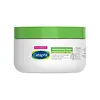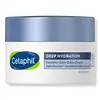What's inside
What's inside
 Key Ingredients
Key Ingredients

 Benefits
Benefits

 Concerns
Concerns

 Ingredients Side-by-side
Ingredients Side-by-side

Water
Skin ConditioningHydrogenated Polydecene
EmollientCaprylic/Capric Triglyceride
MaskingDimethicone
EmollientGlycerin
HumectantButylene Glycol
HumectantCetearyl Olivate
Sorbitan Olivate
EmulsifyingCyclopentasiloxane
EmollientMarrubium Vulgare Extract
Skin ConditioningHydrolyzed Hyaluronic Acid
HumectantOlea Europaea Fruit Oil
MaskingTocopheryl Acetate
AntioxidantAscorbyl Palmitate
AntioxidantLeuconostoc/Radish Root Ferment Filtrate
AntimicrobialPhospholipids
Skin ConditioningIsopropyl Lauroyl Sarcosinate
Skin ConditioningCetearyl Alcohol
EmollientSodium Polyacrylate
Absorbent1,2-Hexanediol
Skin ConditioningCaprylyl Glycol
EmollientPolymethylsilsesquioxane
Isohexadecane
EmollientGlyceryl Stearate
EmollientPEG-100 Stearate
Cetearyl Methicone
Skin ConditioningPhenoxyethanol
PreservativePEG-40 Stearate
EmulsifyingSteareth-2
EmulsifyingSteareth-21
CleansingRetinyl Palmitate
Skin ConditioningLinoleic Acid
CleansingLycopene
AntioxidantWater, Hydrogenated Polydecene, Caprylic/Capric Triglyceride, Dimethicone, Glycerin, Butylene Glycol, Cetearyl Olivate, Sorbitan Olivate, Cyclopentasiloxane, Marrubium Vulgare Extract, Hydrolyzed Hyaluronic Acid, Olea Europaea Fruit Oil, Tocopheryl Acetate, Ascorbyl Palmitate, Leuconostoc/Radish Root Ferment Filtrate, Phospholipids, Isopropyl Lauroyl Sarcosinate, Cetearyl Alcohol, Sodium Polyacrylate, 1,2-Hexanediol, Caprylyl Glycol, Polymethylsilsesquioxane, Isohexadecane, Glyceryl Stearate, PEG-100 Stearate, Cetearyl Methicone, Phenoxyethanol, PEG-40 Stearate, Steareth-2, Steareth-21, Retinyl Palmitate, Linoleic Acid, Lycopene
Water
Skin ConditioningDicaprylyl Carbonate
EmollientGlycerin
HumectantCaprylic/Capric Triglyceride
MaskingGlyceryl Stearate Citrate
EmollientCetearyl Alcohol
EmollientNiacinamide
SmoothingAnhydroxylitol
HumectantButyrospermum Parkii Oil
EmollientCitric Acid
BufferingGlobularia Alypum Leaf Extract
Skin ConditioningHydrolyzed Hyaluronic Acid
HumectantPanthenol
Skin ConditioningPantolactone
HumectantPhenoxyethanol
PreservativeSodium Benzoate
MaskingSodium Polyacrylate
AbsorbentSqualane
EmollientTocopherol
AntioxidantXylitol
HumectantXylitylglucoside
HumectantWater, Dicaprylyl Carbonate, Glycerin, Caprylic/Capric Triglyceride, Glyceryl Stearate Citrate, Cetearyl Alcohol, Niacinamide, Anhydroxylitol, Butyrospermum Parkii Oil, Citric Acid, Globularia Alypum Leaf Extract, Hydrolyzed Hyaluronic Acid, Panthenol, Pantolactone, Phenoxyethanol, Sodium Benzoate, Sodium Polyacrylate, Squalane, Tocopherol, Xylitol, Xylitylglucoside
 Reviews
Reviews

Ingredients Explained
These ingredients are found in both products.
Ingredients higher up in an ingredient list are typically present in a larger amount.
This ingredient is an emollient, solvent, and texture enhancer. It is considered a skin-softener by helping the skin prevent moisture loss.
It helps thicken a product's formula and makes it easier to spread by dissolving clumping compounds.
Caprylic Triglyceride is made by combining glycerin with coconut oil, forming a clear liquid.
While there is an assumption Caprylic Triglyceride can clog pores due to it being derived from coconut oil, there is no research supporting this.
Learn more about Caprylic/Capric TriglycerideCetearyl alcohol is a mixture of two fatty alcohols: cetyl alcohol and stearyl alcohol. It is mainly used as an emulsifier. Emulsifiers help prevent the separation of oils and products. Due to its composition, it can also be used to thicken a product or help create foam.
Cetearyl alcohol is an emollient. Emollients help soothe and hydrate the skin by trapping moisture.
Studies show Cetearyl alcohol is non-toxic and non-irritating. The FDA allows products labeled "alcohol-free" to have fatty alcohols.
This ingredient is usually derived from plant oils such as palm, vegetable, or coconut oils. There is debate on whether this ingredient will cause acne.
Due to the fatty acid base, this ingredient may not be Malassezia folliculitis safe.
Learn more about Cetearyl AlcoholGlycerin is already naturally found in your skin. It helps moisturize and protect your skin.
A study from 2016 found glycerin to be more effective as a humectant than AHAs and hyaluronic acid.
As a humectant, it helps the skin stay hydrated by pulling moisture to your skin. The low molecular weight of glycerin allows it to pull moisture into the deeper layers of your skin.
Hydrated skin improves your skin barrier; Your skin barrier helps protect against irritants and bacteria.
Glycerin has also been found to have antimicrobial and antiviral properties. Due to these properties, glycerin is often used in wound and burn treatments.
In cosmetics, glycerin is usually derived from plants such as soybean or palm. However, it can also be sourced from animals, such as tallow or animal fat.
This ingredient is organic, colorless, odorless, and non-toxic.
Glycerin is the name for this ingredient in American English. British English uses Glycerol/Glycerine.
Learn more about GlycerinHydrolyzed Hyaluronic Acid is a form of hyaluronic acid. It is created by the hydrolysis of hyaluronic acid with a high molecular weight. Once created, Hydrolyzed Hyaluronic Acid has a low molecular weight.
Low molecular weight HA has been shown to hydrate and increase elasticity of the skin. Increasing elasticity is also associated with reduction of wrinkle depth.
One study found topical low molecular weight hyaluronic acid may be considered for the treatment of rosacea in the adult population. However, we always recommend speaking with a professional about your skin concerns.
Hyaluronic acids are a humectant. This means they draw moisture from the air. Hyaluronic acids help moisturize, soothe, and protect the skin.
Read more about other common forms of hyaluronic acid:
Learn more about Hydrolyzed Hyaluronic AcidPhenoxyethanol is a preservative that has germicide, antimicrobial, and aromatic properties. Studies show that phenoxyethanol can prevent microbial growth. By itself, it has a scent that is similar to that of a rose.
It's often used in formulations along with Caprylyl Glycol to preserve the shelf life of products.
Sodium Polyacrylate is the sodium salt of polyacrylic acid. It is used as an absorber, emollient, and stabilizer.
This ingredient is a super-absorbent polymer - meaning it can absorb 100 to 1000 times its mass in water. As an emollient, Sodium Polyacrylate helps soften and soothe skin. Emollients work by creating a barrier to trap moisture in. This helps keep your skin hydrated.
Water. It's the most common cosmetic ingredient of all. You'll usually see it at the top of ingredient lists, meaning that it makes up the largest part of the product.
So why is it so popular? Water most often acts as a solvent - this means that it helps dissolve other ingredients into the formulation.
You'll also recognize water as that liquid we all need to stay alive. If you see this, drink a glass of water. Stay hydrated!
Learn more about Water